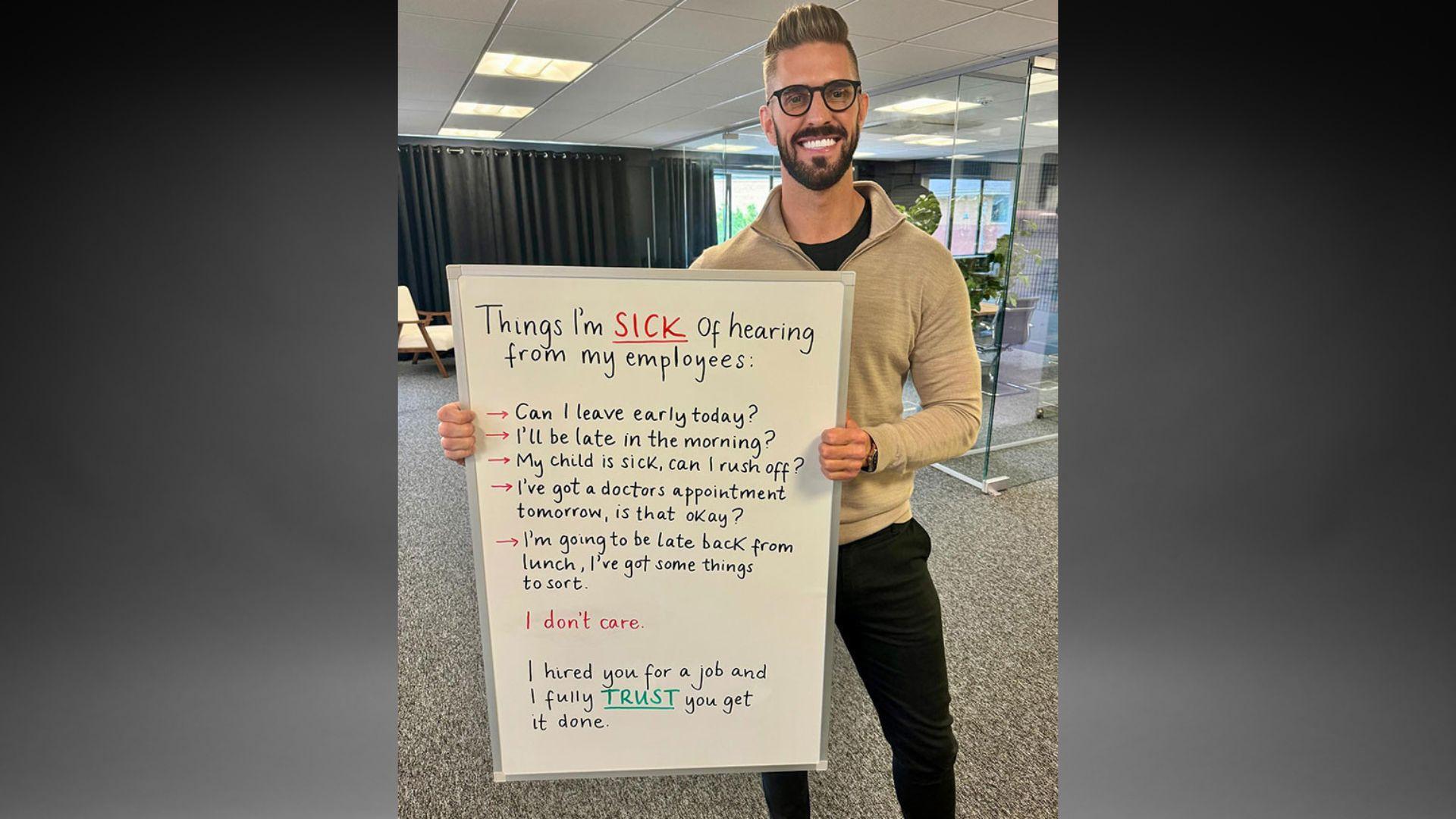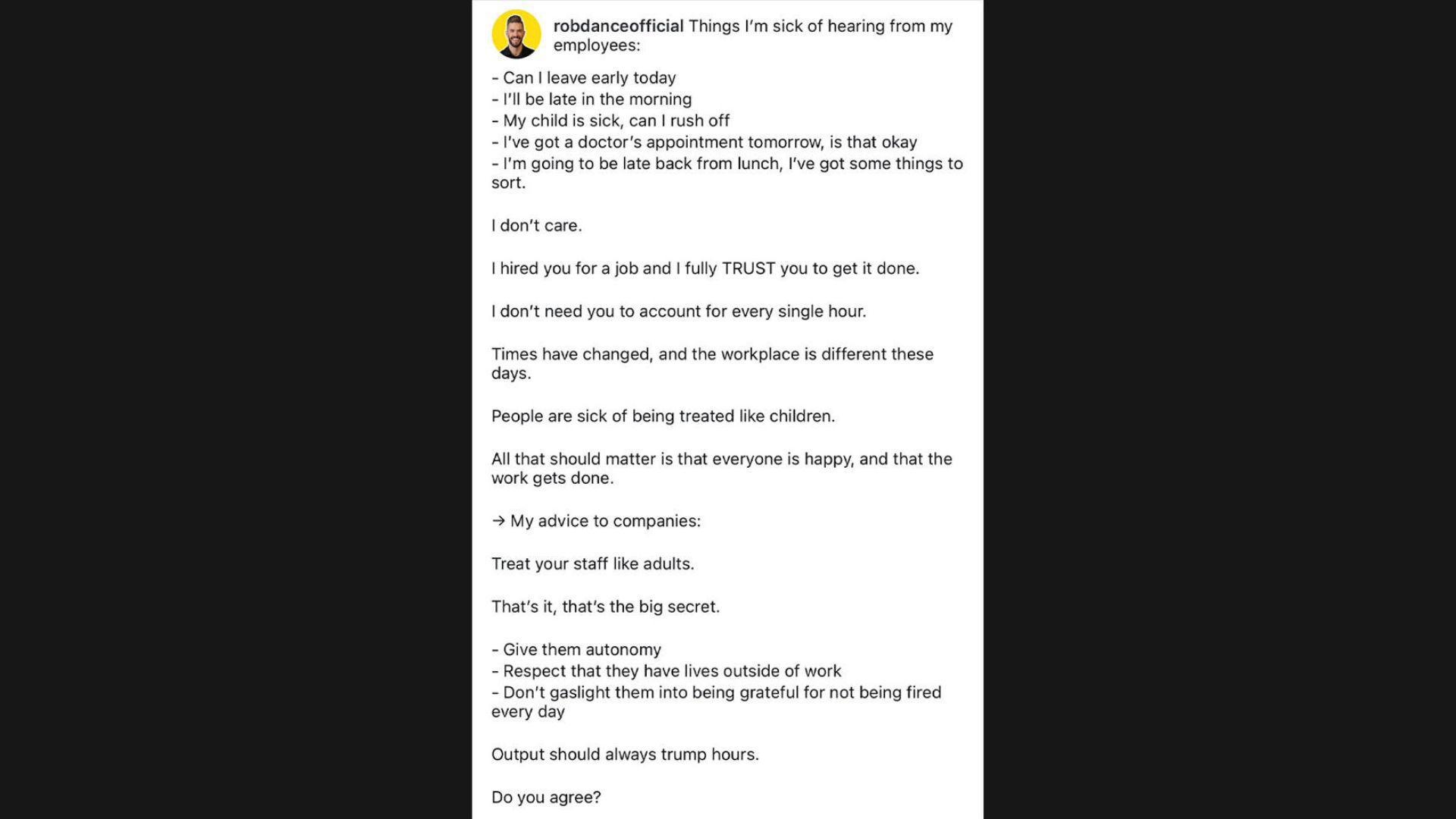Being an employee can be frustrating on a good day, but having a bad boss makes everything worse. For decades, millions of people have simply accepted that their boss will make them miserable because, well, that’s their job. But what if it didn’t have to be that way?
Rob Dance, the founder and CEO of one of the largest consulting firms in the UK, has gone viral after he posted his controversial “Things I’m Sick of Hearing From My Employees” list online. And his no-nos are definitely not what you think they’re going to be.
51% of Americans Agree Their Bosses Set Unrealistic Expectations

Several studies have been conducted to determine how employees really feel about their supervisors or managers. Generally, the studies show that the population is split more or less evenly. Half of those surveyed said they like working for their boss, while a little less than 50% said they don’t.
But what’s interesting is that of those two who reported problems with their direct manager, 51% were frustrated with unreasonable expectations, and 49% reported they were tired of being micromanaged.
Bosses Are Treating Employees Like Children

Unreasonable expectations and micromanagement go hand-in-hand. Several examples of this may be forcing employees to work late, asking for permission to go to the doctor, or monitoring their daily schedule to ensure it’s full to the brim.
As Rob Dance explained, “People are sick and tired of being treated like children, and it’s not how you grow a successful business.”
Rob Dance’s Famous List

Rob Dance, CEO of ROCK consulting firm, posted a photograph on his Instagram page, showing the list of things he’s sick of hearing from his employees. And the list is certainly not one you’d expect to see from a highly successful boss.
Dance said he doesn’t want to hear the following questions or statements: “Can I leave early today? I’ll be late in the morning. My child is sick, can I rush off? I’ve got a doctor’s appointment tomorrow, is that okay? I’m going to be back late from lunch, I’ve got some things to sort.”
Dance Explains His Controversial List

Dance added a caption to his post, explaining why he believes forcing employees to ask him these questions is detrimental to the workplace. He wrote, “I hired you for a job and I fully TRUST you to get it done. I don’t need you to account for every single hour.”
Dance continued, “Times have changed, and the workplace is different these days… All that should matter is that everyone is happy, and that the work gets done.”
Treat Your Staff Like Adults

Dance also wrote, “My advice to companies: Treat your staff like adults. That’s it, that’s the big secret. Give them autonomy. Respect that they have lives outside of work. Don’t gaslight them into being grateful for not being fired every day. Output should always trump hours.”
Dance’s post has since gone viral, and the businessman agreed to sit down with the press and explain his reasoning, as well as what he believes are the biggest problems in the modern workplace.
Micromanaging Creates a Toxic Work Environment

The CEO told Bored Panda, “[Micromanaging] creates a toxic environment where employees feel undervalued and stressed, leading to higher turnover rates and decreased overall performance.
He continued, “Instead of fostering a culture of accountability and growth, this behavior only promotes fear and resentment.”
Employees Shouldn’t Have to Choose Between Life and Work

Dance said he also believes that: “Life is too short to spend five days a week in constant stress and misery. You shouldn’t have to choose between providing for your family and staying mentally stable; it’s just not acceptable.”
And Dance certainly isn’t alone in this sentiment; according to Hubstaff, “72% believe a healthy work-life balance is crucial.” So, creating an environment that offers work-life balance will unquestionably make the majority of employees far happier with their jobs.
Managers Micromanage to Ensure Productivity, But It Doesn’t Work

Dance also told Bored Panda that he thinks he knows why bosses are so quick to micromanage: “Many bosses don’t trust their employees and keep extremely close tabs on them because of past experiences and a desire for control. They might believe that micromanaging ensures productivity and prevents issues.”
He continued, “Additionally, the pressure to meet business targets can drive bosses to monitor employees obsessively, thinking it will lead to better outcomes. This approach, however, only undermines trust and destroys morale in the workplace.”
Toxic Work Environment Leads to High Turnover

Dance then said, “[Micromanaging] creates a toxic environment where employees feel undervalued and stressed, leading to higher turnover rates and decreased overall performance. Instead of fostering a culture of accountability and growth, this behavior only promotes fear and resentment.”
In other words, these so-called high-productivity tactics actually lead to employee dissatisfaction, which decreases productivity and is wildly detrimental to the business as a whole.
Happy Employees Are Good for Business

On the other hand, Dance explained, “Trusting employees and allowing them to work without constant oversight has brought us so many benefits. It fostered a positive work environment where employees feel valued and empowered, boosting their morale and job satisfaction.”
He explained, “This autonomy encourages our people to be more creative and innovative, as employees feel free to experiment and find efficient solutions without worrying about failing.”
Trust Is Everything in Business

Finally, Dance said, “Trust also builds a sense of responsibility and ownership, leading to higher productivity and better quality work. Trust is EVERYTHING in our business!”
While many bosses will likely continue their useless micromanaging, Dance hopes his message will reach at least some supervisors and help improve workplace productivity and satisfaction at the same time. He said, “Having an amazing team who laugh every single day is 100000% better than anything else!”








































